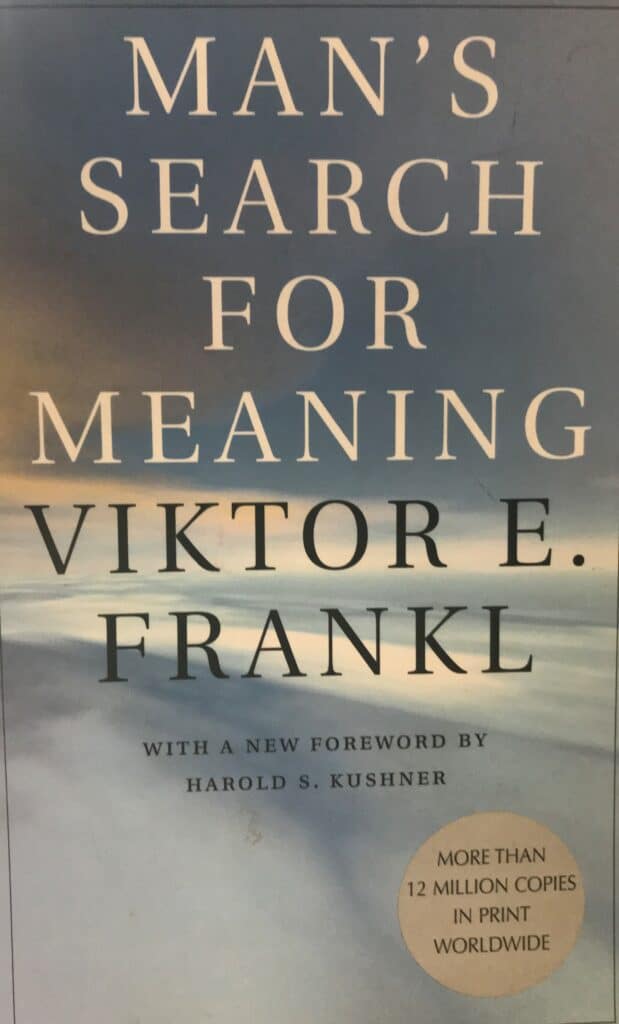Man’s Search for Meaning – A Life-Changing Book
I used to think that our circumstances were what mattered most in terms of our life and how happy we are. I learned otherwise. We are the co-creators of our life, and although we can’t control a lot of what happens to us, we can control how we respond to those happenings. How we react to our circumstances is within our purview of choice.
I first learned of this idea back in college when I read the book Man’s Search for Meaning by Viktor Frankl. Rereading it numerous times over the years, I continued to incorporate this message loud and clear and really live it, among the many other life-changing lessons.

Man’s Search for Meaning
Man’s Search for Meaning was written after WWII when Dr. Viktor Frankl was liberated from the concentration camps. He had been a psychiatrist in Vienna when he, his wife, and parents were rounded up and deported to one of the camps. (His parents and wife were eventually killed.)

From his observations during his internment in four different camps, including Auschwitz, he developed the theory of logotherapy, the therapy of meaning and purpose. He went on to become a world-renowned teacher and doctor of this existential form of psychology.
As an avid reader, book lover, and facilitator of book clubs, I am exhilarated by books that provide insight, new ideas, and different perspectives where the reader learns and develops awareness and knowledge which can contribute to an increase in empathy, understanding, and compassion for ‘the other’ and his/her plight. When you finish a book with many take-aways, that’s a home run.
This is such a book; a book whose concepts can enhance your life and change the way you view things. This is a book of life.
The book is divided into two sections: the first being Frankl’s description of his experiences in the various concentration camps; the second his discussion of logotherapy.
Key Concepts and Themes
I’d like to highlight a few of Frankl’s famous quotes that express key life lessons:
“Everything can be taken from a man but one thing: the last of the human freedoms – to choose one’s attitude in any given set of circumstances, to choose one’s own way.”
How we respond to our circumstances is up to us. That is in our control. It is a choice.
“Between stimulus and response there is a space. In that space is our power to choose our response. In our response lies our growth and freedom.”
We can intentionally use that space to decide how we will respond. There is the situation and then there’s our response in how we act. Between the two, we have the chance to choose how we will handle it.
“When we are no longer able to change a situation, we are challenged to change ourselves.”
We turn to ourselves and our inner resources when our outer circumstances are unchangeable. Again, we actually have that power. Not easy but a choice we can make.
“Man’s inner strength may raise him above his outward fate.”
We must believe that we are more than our external situation. We have strengths that we don’t even realize we have. And we can build them up even more. Research shows that resilience is like a muscle that can be developed. It’s a skill set that can be learned and incorporated into our life.
“He who has a Why to live for can bear with almost any How.” — Nietzsche
Frankl quotes from the German philosopher Nietzsche when discussing the idea of purpose. Having a sense of {larger} purpose can help us cope with the immediate hardship.
It’s not the why of why me, or why is this happening, (why do bad things happen – the perennial existential question to which there is no answer). It’s the Why of purpose. When we live into this Why, we are less likely to succumb. Purpose can be something as specific as ‘someone waiting for him or an unfinished work’.
“Meaning is possible in spite of suffering.”
In fact, suffering behooves us to create meaning out of a loss or hardship in order to carry on through it.
We Are Not Victims
The biggest overall lesson I have carried with me and truly live by is the idea that we are not victims. We may be victims of certain circumstances, but in the end, our life is shaped by how we live with and through the hardships and loss that befall us.
Changing our mindset out of victim-mode is our work; not easy but doable. It is far easier to live by the, ‘woe is me, look at all that’s happened to me…. and if this didn’t happen, I’d be this, that, and the other thing…’, but that leaves us living small and stuck lives of misery.
And I might add, self-inflicted misery. The choice is ours. We must realize we have the choice.
Renewed Meaning and Purpose
We obviously don’t ask for hardships and challenges but once they’re there, we must create renewed meaning and purpose so we can live on well despite.
Look at someone like Christopher Reeves who recreated his life after his paralysis by impacting people in a far greater way than when he was Superman (according to him). And there are umpteen numbers who have not just survived but thrived.
One of the key themes of my life is living well despite adversity (also the name of my book). Inevitably bad things are going to happen; the key is how do we live on in this one life we have and still make it as good as possible?

As Viktor Frankl professes, we don’t succumb, we find new meaning and purpose that contributes to our rebuilding our lives.
What book has been a life-changer for you? If you’ve read Man’s Search for Meaning, what stands out for you and your life? Which of the above quotes resonate with you? We’ve all at times felt like a victim in our lives. What has gotten you out of that? Or are you still there? Have you found that connecting to a sense of purpose helps you get through your difficulties? Let’s have a conversation and dig deep.
Tags Books Inspiration







I saw this man on a YouTube video or PBS. He was so interesting to listen to and to see the happiness on his face. I thought: if this man can find joy after all he’s been through I can too. And my unhappiness couldn’t hold a candle to his. I would like to find his book in a library or buy it and read it over and over….